Academiashop
On this page, you find all documents, package deals, and flashcards offered by seller academiashop.
- 136
- 0
- 2
Community
- Followers
- Following
138 items
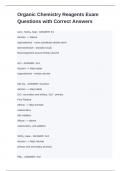
Organic Chemistry Reagents Exam Questions with Correct Answers
- Package deal
- Exam (elaborations)
- • 7 pages •
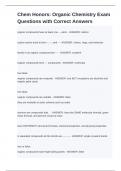
Chem Honors: Organic Chemistry Exam Questions with Correct Answers
organic compounds have at least one --- atom - ANSWER: carbon carbon atoms bond to form --, --, and -- - ANSWER: chains, rings, and networks bonds in an organic compound are --- - ANSWER: covalent organic compounds form --- compounds - ANSWER: molecular true false. organic compounds are nonpolar - ANSWER: true BUT exceptions are alcohols and organic polar acids true false. organic compounds are soluble - ANSWER: false. they are insoluble in polar solvents such as water is...
- Package deal
- Exam (elaborations)
- • 3 pages •
organic compounds have at least one --- atom - ANSWER: carbon carbon atoms bond to form --, --, and -- - ANSWER: chains, rings, and networks bonds in an organic compound are --- - ANSWER: covalent organic compounds form --- compounds - ANSWER: molecular true false. organic compounds are nonpolar - ANSWER: true BUT exceptions are alcohols and organic polar acids true false. organic compounds are soluble - ANSWER: false. they are insoluble in polar solvents such as water is...
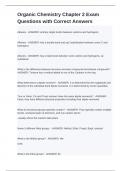
Organic Chemistry Chapter 2 Exam Questions with Correct Answers
Alkanes - ANSWER: entirely single bonds between carbons and hydrogens Alkenes - ANSWER: has a double bond and sp2 hybridization between some C and hydrogens Alkynes - ANSWER: has a triple bond between some carbon and hydrogens, sp hybridized What is the difference between benzene aromatic compound and toluene compound? - ANSWER: Toluene has a methyl added to one of the Carbons in the ring What determines a dipole moment? - ANSWER: It is determined by the magnitude and direction of th...
- Package deal
- Exam (elaborations)
- • 7 pages •
Alkanes - ANSWER: entirely single bonds between carbons and hydrogens Alkenes - ANSWER: has a double bond and sp2 hybridization between some C and hydrogens Alkynes - ANSWER: has a triple bond between some carbon and hydrogens, sp hybridized What is the difference between benzene aromatic compound and toluene compound? - ANSWER: Toluene has a methyl added to one of the Carbons in the ring What determines a dipole moment? - ANSWER: It is determined by the magnitude and direction of th...
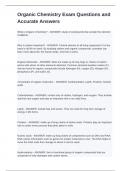
Organic Chemistry Exam Questions and Accurate Answers
What is Organic Chemistry? - ANSWER: study of compounds that contain the element CARBON. Why is carbon important? - ANSWER: Central element to all living organisms!! It is the basis to all life on earth. By studying carbon and organic compounds, scientists can learn more about life, the human body, and how it works. Organic Molecules - ANSWER: Most are made up of long rings or chains of carbon atoms with atoms of other elements attached. Common elements besides carbon (C) that are found in...
- Package deal
- Exam (elaborations)
- • 3 pages •
What is Organic Chemistry? - ANSWER: study of compounds that contain the element CARBON. Why is carbon important? - ANSWER: Central element to all living organisms!! It is the basis to all life on earth. By studying carbon and organic compounds, scientists can learn more about life, the human body, and how it works. Organic Molecules - ANSWER: Most are made up of long rings or chains of carbon atoms with atoms of other elements attached. Common elements besides carbon (C) that are found in...
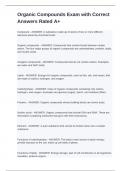
Organic Compounds Exam Questions with Correct Answers Rated A+
Compound - ANSWER: A substance made up of atoms of two or more different elements joined by chemical bonds. Organic compounds - ANSWER: Compounds that contain bonds between carbon atoms. The four major groups of organic compounds are carbohydrates, proteins, lipids, and nucleic acids. Inorganic compounds - ANSWER: Compounds that do not contain carbon. Examples are water and NaCl (salt). Lipids - ANSWER: Energy-rich organic compounds, such as fats, oils, and waxes, that are made of carbo...
- Package deal
- Exam (elaborations)
- • 3 pages •
Compound - ANSWER: A substance made up of atoms of two or more different elements joined by chemical bonds. Organic compounds - ANSWER: Compounds that contain bonds between carbon atoms. The four major groups of organic compounds are carbohydrates, proteins, lipids, and nucleic acids. Inorganic compounds - ANSWER: Compounds that do not contain carbon. Examples are water and NaCl (salt). Lipids - ANSWER: Energy-rich organic compounds, such as fats, oils, and waxes, that are made of carbo...
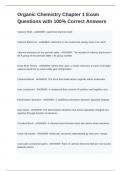
Organic Chemistry Chapter 1 Exam Questions with 100% Correct Answers
Valence Shell - ANSWER: outermost electron shell Valence Electrons - ANSWER: electrons on the outermost energy level of an atom Valence electrons on the periodic table - ANSWER: The number of valence electrons in an A group of the periodic table = its group number Octet Rule Theory - ANSWER: Atoms lose, gain, or share electrons to have a full eight valence electrons to reach noble gas configuration Chemical Bond - ANSWER: The force that holds atoms together within molecules Ionic ...
- Package deal
- Exam (elaborations)
- • 9 pages •
Valence Shell - ANSWER: outermost electron shell Valence Electrons - ANSWER: electrons on the outermost energy level of an atom Valence electrons on the periodic table - ANSWER: The number of valence electrons in an A group of the periodic table = its group number Octet Rule Theory - ANSWER: Atoms lose, gain, or share electrons to have a full eight valence electrons to reach noble gas configuration Chemical Bond - ANSWER: The force that holds atoms together within molecules Ionic ...
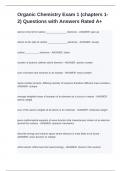
Organic Chemistry Exam 1 (chapters 1-2) Questions with Answers Rated A+
atoms to the left of carbon _______________ electrons - ANSWER: give up Atoms to the right of carbon ______________ electrons - ANSWER: accept carbon __________ electrons - ANSWER: share number of protons; defines which element - ANSWER: atomic number sum of protons and neutrons in an isotope - ANSWER: mass number Same number protons, differing number of neutrons therefore different mass numbers - ANSWER: isotope average weighted mass of isotopes of an element as it occurs in n...
- Package deal
- Exam (elaborations)
- • 5 pages •
atoms to the left of carbon _______________ electrons - ANSWER: give up Atoms to the right of carbon ______________ electrons - ANSWER: accept carbon __________ electrons - ANSWER: share number of protons; defines which element - ANSWER: atomic number sum of protons and neutrons in an isotope - ANSWER: mass number Same number protons, differing number of neutrons therefore different mass numbers - ANSWER: isotope average weighted mass of isotopes of an element as it occurs in n...
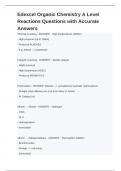
Edexcel Organic Chemistry A Level Reactions Questions with Accurate Answers
Thermal Cracking - ANSWER: - High temperatures (1000C) - High pressure (up to 70atm) - Produces ALKENES - E.g. ethene --> polyethene Catalytic Cracking - ANSWER: - Zeolite catalyst - Slight pressure - High temperature (450C) - Produces AROMATICS Reformation - ANSWER: Alkanes --> cycloalkanes/ aromatic hydrocarbons - Straight chain alkanes are a lot more likely to 'knock' - Pt Catalyst (ct) Alkene → Alkane - ANSWER: - Hydrogen - 150C - Ni ct - Hydrogenation -...
- Package deal
- Exam (elaborations)
- • 7 pages •
Thermal Cracking - ANSWER: - High temperatures (1000C) - High pressure (up to 70atm) - Produces ALKENES - E.g. ethene --> polyethene Catalytic Cracking - ANSWER: - Zeolite catalyst - Slight pressure - High temperature (450C) - Produces AROMATICS Reformation - ANSWER: Alkanes --> cycloalkanes/ aromatic hydrocarbons - Straight chain alkanes are a lot more likely to 'knock' - Pt Catalyst (ct) Alkene → Alkane - ANSWER: - Hydrogen - 150C - Ni ct - Hydrogenation -...
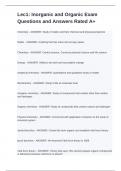
Lec1: Inorganic and Organic Exam Questions and Answers Rated A+
Chemistry - ANSWER: Study of matter and their chemical and physical properties Matter - ANSWER: Anything that has mass and occupy space Chemistry - ANSWER: Central science. Connects physical science and life science Energy - ANSWER: Ability to do work and accomplish change Analytical chemistry - ANSWER: Quantitative and qualitative study of matter Biochemistry - ANSWER: Study of life at molecular level Inorganic chemistry - ANSWER: Study of compounds that contain other than car...
- Package deal
- Exam (elaborations)
- • 4 pages •
Chemistry - ANSWER: Study of matter and their chemical and physical properties Matter - ANSWER: Anything that has mass and occupy space Chemistry - ANSWER: Central science. Connects physical science and life science Energy - ANSWER: Ability to do work and accomplish change Analytical chemistry - ANSWER: Quantitative and qualitative study of matter Biochemistry - ANSWER: Study of life at molecular level Inorganic chemistry - ANSWER: Study of compounds that contain other than car...
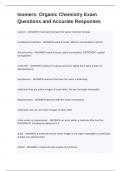
Isomers: Organic Chemistry Exam Questions and Accurate Responses
isomers - ANSWER-molecule that have the same molecule formula constitutional isomers - ANSWER-same formula, different connectivity of atoms stereoisomers - ANSWER-same formula, same connectivity, DIFFERENT spatial arrangement conformer - ANSWER-rotation of a group around a sigma bond (also known as stereoisomers) enantiomers - ANSWER-isomers that have the same connectivity molecules that are mirror images of each other, but are not super imposable diastereomers - ANSWER-isomers...
- Package deal
- Exam (elaborations)
- • 2 pages •
isomers - ANSWER-molecule that have the same molecule formula constitutional isomers - ANSWER-same formula, different connectivity of atoms stereoisomers - ANSWER-same formula, same connectivity, DIFFERENT spatial arrangement conformer - ANSWER-rotation of a group around a sigma bond (also known as stereoisomers) enantiomers - ANSWER-isomers that have the same connectivity molecules that are mirror images of each other, but are not super imposable diastereomers - ANSWER-isomers...
